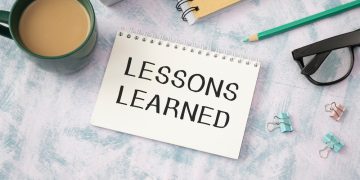–
Paperwork onboard is increasing daily. How really we end up at this situation? Just figure out that if three hundred experts are involved in various shipping sectors, sooner or later they will send their ideas in the form of procedures on board and these procedures will be implemented by few people who already have a lot of things to do. We tend to forget that despite the enormous technological changes and the strict safety requirements, shipping is still a dangerous profession. The only way to minimize the danger is to give emphasis on seamanship. ‘Seamanship’ comprises the skills that are specific for seafaring, and there are manuals of seamanship. For me, seamanship is a blend of professional knowledge, professional pride, and experience-based common sense. Unfortunately, we are losing seamanship as it is obvious that we don’t want our people to thing; this is dangerous.
We all know that new requirements are rising every day, just imagine how hard it is for the people onboard to follow the changes. The majority of rules and regulations are developed by scientific personnel and the wording is checked very thoroughly by lawyers in order to ensure that legal implication, in the implementation phase, will be kept as slow as possible. As a result, in most of the cases, Rules, Regulations and Procedures are written in a scientific language which is very difficult to be understood and therefore, people onboard as well as ashore cannot follow them. Each requirement, in the majority of the cases, has so many references that is forcing the seafarer to go from one chapter to the other and at the end he is absolutely confused.
The implementation of ISM and various quality systems such as ISO 9001/14001/18001, 500001 has made documentation and report management much more complicated. For instance, the corresponding extra paperwork has brought the crew to a boring situation, which can increase the possibility of marine accidents due to human errors. We have somehow misunderstood ISM as we are concentrated on papers. Crew members feel that the extra workload caused by paperwork will soon lead to marine accidents. They are trying to find free time to complete all documents required and as a result they are trying to do it even while performing critical operations such as bridge and cargo watches. In this respect, I believe that the SMS should not allow, in any case, the crew to focus on the relative paperwork and not to pay attention to fundamental duties during a sea voyage, e.g. keep a proper look out, avoid a main engine black out etc. We should not allow our people to complete papers and bureaucratic processes when they are performing the daily critical jobs.
We’ve all heard of systems analysis, forms control, records retention, work measurement, incentives, mechanization, integrated data processing, statistical sampling, automation, operations research, empathy, humanics, human engineering, and other. Each of these has frequently been presented by some as a cure‐all for our problems. However experience has shown the opposite. The majority of these systems are finally adding more and more paperwork.
Despite all these disappointing things, there is a key which is capable to help us find the solution; the key is ”understanding”. But understanding what? First we must define what we mean by paperwork. Paperwork is any official document that need to be prepared for something to happen or to be done. Then we must categorize these documents to the following five basic categories: Routine operational documents; Safety related documents; Technical & Maintenance Records; Quality & Environmental Documents; Security documents.
Routine operational are the documents involved in Pre-arrival formalities for port authorities, cargo related documents, Class documents etc. Unfortunately there is no room for changes as each Country, Port, Agent, Charterer has its own requirements.
Safety documents such as inspections, checking & monitoring forms, checklists, measurements etc contain a significant amount of information. The crew has to complete this information repeatedly in certain forms. The solution is to develop ‘smart forms’; Development of smart forms and checklist where standard data is automatically completed will minimize the time required to complete a document. Regarding the technical and maintenance records, all records related to performance should be eliminated. Required data should be transmitted through electronic systems. Only maintenance related and daily work documents should be completed by engineers.
For the Quality and Environmental documents, seafarers consider that a significant number of these are imposed by third parties and are not adding any value in safety. Their scope is to satisfy people like Majors, Class, Auditors etc. Security documents are the most unwanted documents. Seafarers consider their existence meaningless and consider that they are developed to satisfy Politicians. Port & vessels security is not effectively enhanced by having ordinary seamen to prevent highly hypothetical situations like terrorist , bomb threats, biological weapons etc. I really cannot understand Security Level 3. If the ship is operating at this level, then it is not permitted to call because the port is unsafe. Now, if the ship is at port and the security level is raised to level 3, then authorities will guide the ship what to do. Then, why we need all these documentation and all these meaningless papers for completion on board? There is only one valid requirement; patrol, detect and report any suspicious person, activity or project. That’s the only thing the crew can do, the rest is for the authorities.
We actually need to review, revise and develop effective rules; compliance, procedural and action rules. Compliance rules should define measurable goals to be achieved and leave autonomy to the individuals to achieve the measurable Goals. By this seafarers will exercise seamanship. Procedural rules should define the sequence of actions or instructions to be followed in solving a problem or completing a task. Procedures in form of Flowcharts will enable seafarers to execute tasks accurately without deviations. Action rules should define concrete actions and thereby removing almost all freedom of choice and interpretation. An action rule defines the specific actions that are taken if particular conditions are met.
In conclusion, legislators should understand that procedures applicable in the land-based industry, aviation, nuclear industry etc. cannot be transferred in shipping without the necessary modifications. Ship Managers should understand that they cannot ask more and more tasks to be completed by the same people onboard. Seamanship is only gained by an effective on the Job Training. Never a vessel sunk because a piece of paper was missing. The ship’s Master is not a Lawyer neither holds a PhD. on scientific environmental issues. He is a Mariner trained to sail the ship its cargo and the crew safely from one port to another.
Above article is an edited version of Dimitrios Stamoudis presentation during 2014 SAFETY4SEA Forum
More details may be found by viewing his Presentation video





























































In 9 years nothing is change. On the contrary,it became worst. Maybe it is time to find another job and let the bureaucrats from Management (who have never set foot on a ship in their life) especially QHSE dept. to sail the ships.